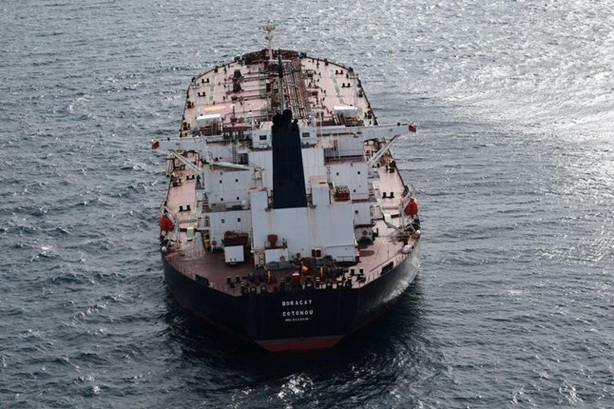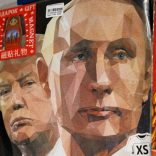Airlines suspend Middle East flights
Oil slips on oversupply worries, sanctions risk in focus

FILE - An aerial view shows the oil tanker named Boracay (also called Pushpa), a vessel being investigated by French authorities and suspected of belonging to the so-called "shadow fleet" involved in the Russian oil trade, off the coast of the western France port of Saint-Nazaire, France, October 2, 2025. [File photo: Reuters/Stephane Mahe]
Oil prices dipped in Asian trade on Tuesday as oversupply concerns outweighed uncertainty over the impact of U.S. sanctions on Russian oil majors Rosneft and Lukoil and optimism over progress toward reopening the U.S. government.
Brent crude futures fell 12 cents, or 0.2%, to $63.94 a barrel by 0426 GMT. U.S. West Texas Intermediate crude was at $59.99 a barrel, down 14 cents or 0.2%.
Both benchmarks gained around 40 cents in the previous session.
The longest government shutdown in U.S. history could end this week after the Senate approved a compromise that would restore federal funding. The deal now goes to the House of Representatives, where Speaker Mike Johnson has said he would like to pass it as soon as Wednesday.
While progress toward reopening the government has boosted markets broadly, worries about crude oversupply are keeping a lid on oil prices.
“As OPEC production increases grind on, global oil balances are acquiring an increasingly bearish hue on the supply side of the ledger with demand still trending lower in conjunction with a slowed economic growth path among major oil-consuming countries,” analysts at energy advisory firm Ritterbusch and Associates said in a note.
Earlier this month, OPEC+ agreed to increase December output targets by 137,000 barrels per day, the same as for October and November. It also agreed to a pause in increases in the first quarter of next year.
While the oil glut triggered by rising OPEC supply has made investors increasingly bearish in recent weeks, U.S. sanctions also remain in focus, ANZ analysts said in a note on Tuesday, referring to President Donald Trump’s latest measures targeting Russian oil majors Rosneft and Lukoil.
Sources told Reuters on Monday that Lukoil declared force majeure at its Iraqi oil field and Bulgaria was poised to seize its Burgas refinery. The force majeure at the West Qurna-2 field in Iraq marks the biggest fallout yet from the sanctions imposed last month.
Elsewhere, the volume of oil stored onboard ships in Asian waters doubled in recent weeks after tightening Western sanctions hit exports to China and India and import quota limits curbed demand from independent Chinese refiners, analysts said. Some refiners in China and India have switched to buying oil from the Middle East and elsewhere.
One potential challenge to oil’s bearish outlook “is the extent to which China will continue to push Russian supplies into strategic stockpiles and whether India will succumb to Trump’s suggestions that the country defer further purchases from Russia,” Ritterbusch added.












Leave a Reply
Be the First to Comment!
You must be logged in to post a comment.
You must be logged in to post a comment.